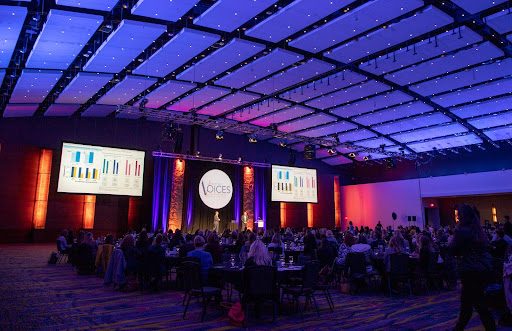Three takeaways from the 2021 Women Lead Change Central Iowa Conference

Photo by Emily Kestel
The theme of this year’s Women Lead Change Central Iowa Conference was “Joining Voices: Leaders for Equity.”
One way I like to practice equity is by sharing knowledge. In this case, sharing knowledge looks like sharing the highlights of the nine pages of notes I took while listening to the keynote speakers and attending a few of the breakout sessions.
Before you assume that because the conference has the word “women” in it that’s only meant for women, think again. The following takeaways can be of use to anyone.
Adults don’t laugh nearly enough, and fear is a big reason why.
The average toddler laughs 300 times a day. By the time you reach 40, that number drops to an average of four times a day.
Fear has a big role in our lack of joy, author Judi Holler said in the opening keynote address. That manifests itself through comparison, doubting ourselves, staying in our comfort zones and caring what other people think.
A lot of this comes from always being on our devices.
One survey found that 81% of employees check their work email on weekends and 59% stay on top of their emails while on vacation. Another survey showed that the average U.S. worker spends 6.3 hours a day checking email. Additionally, Americans spend more than two hours a day on social media.
“We’re not unplugging,” Holler said. That leaves less time to do things that make you feel alive.
“Being brave requires stamina, focus and being awake,” she said. “You cannot be exhausted, crazy busy, overwhelmed, sick AND be brave.”
Holler recommends people conduct “small fear experiments” every day. This could be walking up to someone and introducing yourself, sitting in the front row of a meeting, speaking up first on a conference call, or wearing a new color or pattern.
Men are the missing ingredient to getting to gender equity.
Until men step off the sidelines and call out bias and mistreatment of women, contribute their fair share of work at home, and educate themselves about women’s experiences, gender equity will not be a reality.
The authors of “Good Guys: How Men Can Be Better Allies for Women in the Workplace,” Brad Johnson and David Smith, spoke at length about the importance of being a good ally at work and at home. (Read an extended Q&A with the authors that was published in our Fearless newsletter.)
One way I like to practice equity is by sharing knowledge. In this case, sharing knowledge looks like sharing the highlights of the nine pages of notes I took while listening to the keynote speakers and attending a few of the breakout sessions.
Before you assume that because the conference has the word “women” in it that’s only meant for women, think again. The following takeaways can be of use to anyone.
Adults don’t laugh nearly enough, and fear is a big reason why.
The average toddler laughs 300 times a day. By the time you reach 40, that number drops to an average of four times a day.
Fear has a big role in our lack of joy, author Judi Holler said in the opening keynote address. That manifests itself through comparison, doubting ourselves, staying in our comfort zones and caring what other people think.
A lot of this comes from always being on our devices.
One survey found that 81% of employees check their work email on weekends and 59% stay on top of their emails while on vacation. Another survey showed that the average U.S. worker spends 6.3 hours a day checking email. Additionally, Americans spend more than two hours a day on social media.
“We’re not unplugging,” Holler said. That leaves less time to do things that make you feel alive.
“Being brave requires stamina, focus and being awake,” she said. “You cannot be exhausted, crazy busy, overwhelmed, sick AND be brave.”
Holler recommends people conduct “small fear experiments” every day. This could be walking up to someone and introducing yourself, sitting in the front row of a meeting, speaking up first on a conference call, or wearing a new color or pattern.
Men are the missing ingredient to getting to gender equity.
Until men step off the sidelines and call out bias and mistreatment of women, contribute their fair share of work at home, and educate themselves about women’s experiences, gender equity will not be a reality.
The authors of “Good Guys: How Men Can Be Better Allies for Women in the Workplace,” Brad Johnson and David Smith, spoke at length about the importance of being a good ally at work and at home. (Read an extended Q&A with the authors that was published in our Fearless newsletter.)
“Gender allyship skills are gateway skills,” they said. Once you nail down the best practices of being a good ally to women, it’s easy to become an ally for other underrepresented or marginalized identities.
Johnson and Smith recommended that men abide by the 36-minute campaign, first implemented by JP Morgan Chase.
For 30 minutes a week, get coffee or lunch with a talented or up-and-coming woman. Spend five minutes a week congratulating female colleagues on a job well done or a personal success. Lastly, take just one minute a week talking up a woman to other colleagues.
Doing this drastically improves women’s professional development and growth.
Yes, you do have time to do what you want.
News flash: Everyone has the same amount of time as everyone else.
If it feels like you don’t have time to do what you need or want, perhaps you should track your time for a week to see where it’s going, author Laura Vanderkam said.
“We’re resistant to do this because we don’t want to know how much time we’re wasting,” she said.
Vanderkam suggests creating categories for every type of task you do – whether it’s eating, working, sleeping, driving, running errands, watching TV or cooking – and then jotting down how much time is spent doing each.
Then ask yourself: What do I like the most? What do I want to do more of? What do I want to get off my plate?
Use that as a guiding point for planning out your weekly schedules. Do you enjoy cooking but hate going grocery shopping? Consider getting your groceries delivered and then use that time saved to cook a meal you wouldn’t have been able to otherwise.
“When you say, ‘I don’t have time,’ what you really mean is ‘It’s not a priority,’” Vanderkam said.
More takeaways from the conference will be in the Nov. 8 edition of Fearless. Subscribe to the free e-newsletter here.
Related:Report: More women are being added to the C-suite, but ‘glass cliff’ could be at play










